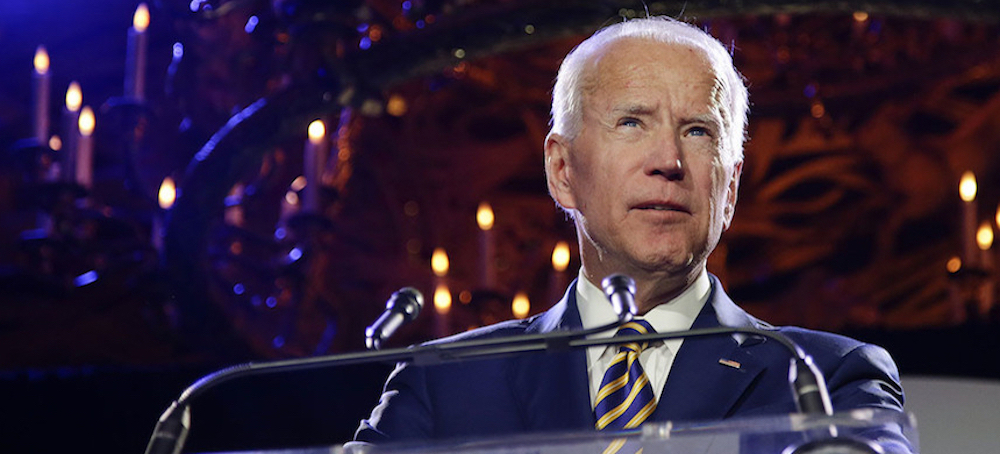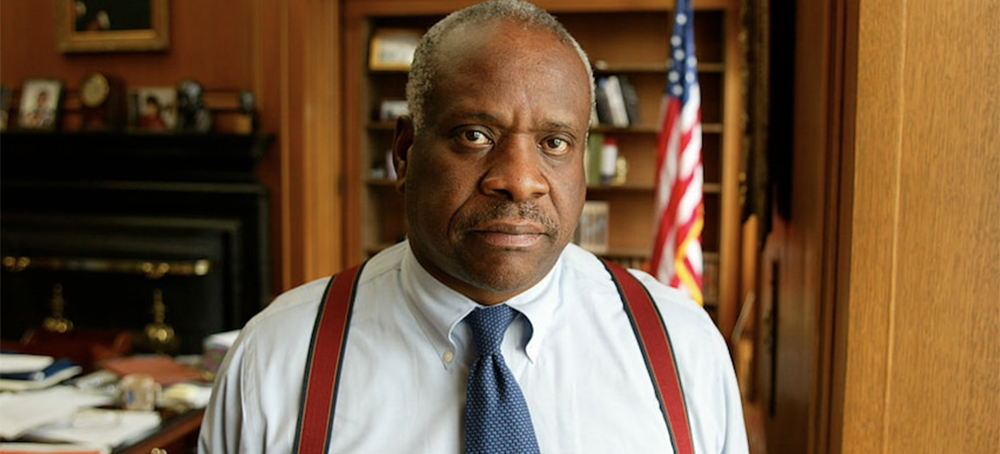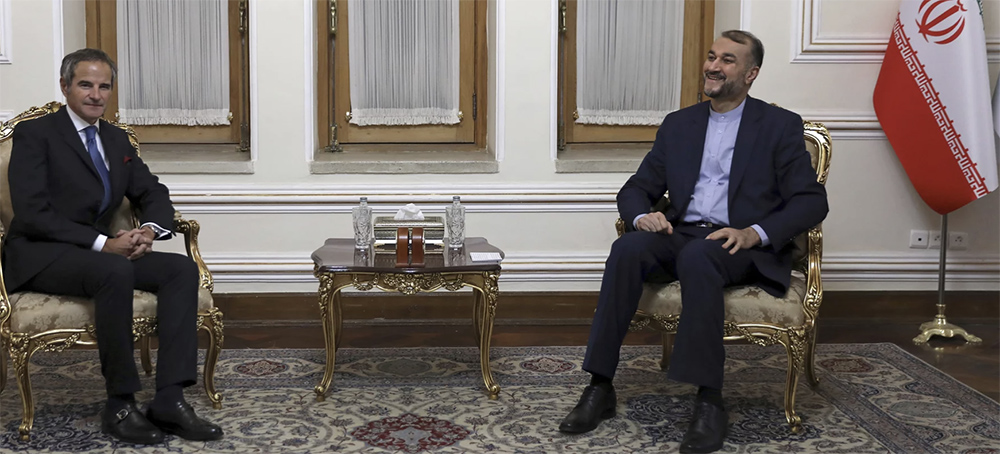Live on the homepage now!
Reader Supported News
Specifically, the waiver allows helping Iran decommission its planned heavy water nuclear reactor at Arak, providing its medical research reactor with fuel, and taking out of the country excess stockpiles of low enriched uranium beyond the quantities allowed by the JCPOA.
On Tuesday, David E. Sanger, Lara Jakes and Farnaz Fassihi had reported at The New York Times that a return to the 2015 nuclear deal by the USa, which was sabotaged by Trump in May, 2018, may be imminent.
There does seem to be movement on the Iran talks in Vienna. Earlier this week Russian foreign minister Sergei Lavrov told Dubai-based al-Arabiya that he was “optimistic” about the course of the negotiations, according to BBC Monitoring. Iranian negotiator Ali Bagheri Kani told the Iranian parliament this week that arrangements are now in place, owing to the negotiations, for a “win-win” agreement.
Both American and Iranian hard liners are attempting to scuttle the talks. Virtually no one in the Republican Party supports the negotiations, and the Israeli lobbies are up in arms at the very idea of peace with Iran.
In Iran, some members of the far right Steadfastness Front have attempted to convince Iran’s clerical Leader, Ali Khamenei, to abandon the talks and to enrich uranium at an even higher level in hopes of dividing Russia and China, who support Iran, from France, Britain and the US. The government of President Ibrahim Raisi, who is himself a hard liner, has nevertheless committed itself to a successful outcome to the negotiations if Iran can achieve genuine sanctions relief from the US.
The US waiver on nuclear consultations was revoked in 2020 by then Secretary of State Mike Pompeo, two years after Trump had withdrawn from the 2015 nuclear deal with Iran. The deal, the Joint Comprehensive Plan of Action (JCPOA) had limited Iran’s nuclear enrichment activities in return for the dropping of UN and US sanctions. The US Republican Party, however, refused to allow the lapsing of US sanctions on Iran, and even sabotaged an Iranian plan to buy passenger jets from Boeing, costing America billions of dollars and thousands of jobs.
Since not allowing other countries’ officials to help dismantle Iran’s uranium enrichment programs serves no conceivable US purpose, Pompeo’s move has to be seen as one of the stupidest formal government policies ever enacted.
Iran had scrupulously adhered to its obligations under the 2015 deal even after Trump trashed it and imposed a financial and trade blockade on Iran. Tehran, however, ceased strictly abiding by the 2015 treaty two years after Trump destroyed it, on the reasonable grounds that it had never received the sanctions relief promised it in return for mothballing 80% of its civilian nuclear enrichment program. Tehran is negotiating in Vienna indirectly with the US through meetings with the remaining signatories to the JCPOA, Britain, France, Russia, China, and Germany. The US has an office in Vienna on the sidelines of these talks and is being consulted by its allies.
Iran’s right wing president, Ibrahim Raisi, says he is willing to go back into compliance with the JCPOA if the US lifts all sanctions on Iran. The Biden administration says it is willing to offer some sanctions relief, but will not lift sanctions imposed for reasons other than the nuclear program.
Raisi also wants some mechanism enacted that will prevent the US from slapping sanctions back on and pulling out of the deal again in 2024 if the Republicans take the White House.
The Trump financial and trade embargo imposed from 2018, which went so far as to stigmatize Iran’s central bank as a terrorist organization, has devastated the Iranian economy. If Leader Khamenei does permit the 2015 deal to be resurrected, despite his deep and justified suspicion of the US, it will only be because he wants his economy back and fears unrest if the US maximum pressure continues.
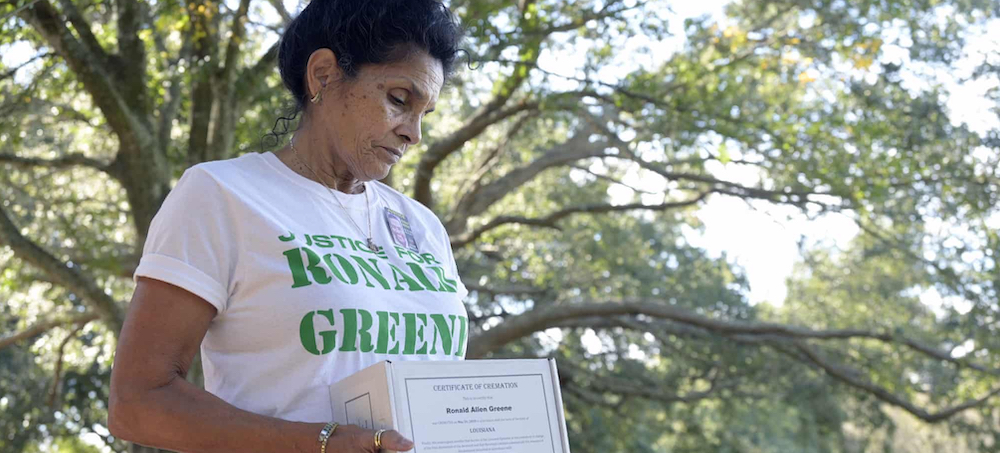 Mona Hardin, whose son, Ronald Greene was killed after a police arrest. 'You just can't keep overlooking the murder of a man. You can't keep letting these killer cops get away with it.' (photo: Phelan M. Ebenhack/AP)
Mona Hardin, whose son, Ronald Greene was killed after a police arrest. 'You just can't keep overlooking the murder of a man. You can't keep letting these killer cops get away with it.' (photo: Phelan M. Ebenhack/AP)
Police are accused of a cover-up in Ronald Greene’s death – and now the governor has had to deny political interference. Mona Hardin, Greene’s mother, says enough is enough
“It’s hard to sleep,” Hardin told the Guardian in an interview. “But it’s something I have to push myself through. It has destroyed my family, because of what we saw and what we know.”
It was 10 May 2019 when Greene was arrested by Louisiana state police for an unspecified traffic violation. The story made public by police back then was that the 49-year-old Black man had led troopers on a high-speed pursuit, crashed his car, and then engaged in “a struggle” before dying.
But gradually a clearer narrative emerged, laced with brutality and attempted cover-up. Greene, who was unarmed, had been stunned multiple times with tasers, punched in the face, placed in a chokehold and shackled, and had lain prone for almost 10 minutes before his death at the hands of six white troopers.
Body-camera footage of the incident was suppressed for two years until the Associated Press published excerpts last year, showing Greene, his face bloodied, pleading with officers to desist.
“I’m sorry!” Greene said. “I’m your brother! I’m scared!”
A US justice department civil rights and wrongful death investigation remains pending after an internal review declined to bring charges, allegedly following pressure from senior members of the state police force.
But this week, new revelations have sent shockwaves around Louisiana, forcing the state’s Democratic governor, John Bel Edwards, to publicly deny he had delayed or interfered with investigations into Greene’s death.
The Associated Press reported Edwards received a text message from Louisiana state police superintendent Kevin Reeves just hours after Greene’s death, informing Edwards of a “violent, lengthy struggle” leading to the Black motorist’s death, at a time when public information on the incident was scant.
Superintendent Reeves resigned in October 2020 amid mounting scrutiny of the department in the wake of Greene’s death.
The message was sent as Edwards was fighting a re-election campaign in a deep red state, which saw the governor make little comment on Greene’s death until years later. The reporting also suggests that Edwards’s handling of the incident is now part of the federal civil rights investigation.
During a heated press conference this week, the governor struck a defiant line after his office insisted the text alert had been standard operating procedure.
“There are implications that I knew more, or that one or more of my staff members tried to cover up what happened. I will say that that is simply and categorically false,” he said, acknowledging for the first time in public that the killing was a racist act.
“It is sad. It is regrettable that I am here under these circumstances talking about these things. But unfortunately, it is unavoidable.”
The governor is facing increasingly bipartisan criticism, both from state Republicans who control Louisiana’s legislature, and members of the Democratic Black caucus who held a heated closed door meeting with Edwards earlier this week.
Hardin, who lives in Florida, and lost her job shortly after her son’s death due to stress, remained unconvinced by the governor’s denial and has called for his resignation.
“It’s a cowardly way for him to approach the murder of a man by his state troopers,” she said. “He said the text message was standard procedure, but there was no follow-up on his end after the murder of a man? They carelessly and lightly really insisted this was ‘standard procedure’. But no one ever made any effort to be honest with me.”
Edwards won an incredibly tight 2019 re-election campaign on the shoulders of Black voters. According to election analysis, he won 99% support among the Black community, who turned out in high numbers to push him over the line.
“It’s going to be very difficult for Black people to trust him again,” said Eugene Phillips, president of the NAACP Baton Rouge chapter. “He’s going to have to really work hard to rebuild that trust. And at this point I don’t know if he can.”
Phillips reiterated the NAACP’s demand that Edwards meet with the Greene family to explain the message and his prior knowledge of the case. As of Wednesday, the Greene family had received no communication from the governor.
Edwards, a centrist, is the only statewide Democrat elected to office in Louisiana, and has recently made pronounced comments about the legacy of racism in the state. Last month the governor signed a pardon for Homer Plessy, the civil rights pioneer whose act of civil disobedience in 1892 led to the infamous Plessy v Ferguson supreme court decision.
“The stroke of my pen on this pardon, while momentous, it doesn’t erase generations of pain and discrimination,” Edwards said at the time. “It doesn’t eradicate all the wrongs wrought by the Plessy court, or fix all of our present challenges.”
But the governor has also signed into law a controversial “blue lives matter” bill in 2016. The act expanded the state’s existing list of groups protected against hate crimes on grounds of race, religion, sexual orientation and other minority groups to include law enforcement officers and other first responders. It faced significant criticism from civil liberties groups and Black Lives Matter activists at the time.
For some observers, Edwards’s “standard procedure” defense is perhaps in line with his character both as a no-frills straight-talker, but also as the son and brother of law enforcement officers.
“Edwards is very careful. He’s a lawyer with a family background in law enforcement. He’s not given to wild pronouncements or getting ahead of a story,” said Dr Pearson Cross, associate professor of political science at the University of Louisiana at Lafayette. “I also think he would be inclined to accept the story, as it was originally told, until he had proof that it was different.”
For Mona Hardin, the wait for answers continues.
“We still have to hope and pray that everyone digs down real deep, to bring this to its proper course and for everyone who had their hand in this to be held accountable,” she said.
“You just can’t keep overlooking the murder of a man. You can’t keep letting these killer cops get away with it,” she added. “It’s organized crime.”
Body camera video obtained by The Associated Press shows Louisiana troopers stunning, punching and dragging a Black man as he apologizes for leading them on a high-speed chase. The arrest is the subject of a federal civil rights investigation. (May 19)
Louisiana State Police after a press conference Friday, released additional video of the arrest and death of Ronald Greene.
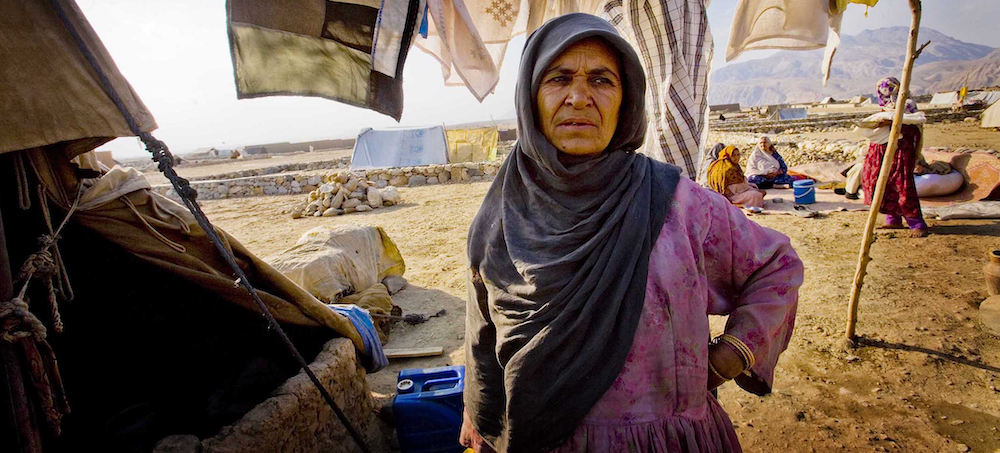 A woman in Afghanistan. (photo: Kate Holt/InterAction)
A woman in Afghanistan. (photo: Kate Holt/InterAction)
But if more Americans knew how many innocent civilians actually die as a result of these sanctions, would the worst of them be permitted?
We may be about to find out in Afghanistan. Sanctions currently imposed on the country are on track to take the lives of more civilians in the coming year than have been killed by 20 years of warfare. There’s no hiding it any more.
Projections through the winter estimate that 22.8 million people will face “high levels of acute food insecurity.” This is 55% of Afghanistan’s population, the highest ever recorded in the country. An estimated 1 million children are suffering from “severe acute malnutrition” this year. Children who are malnourished are more likely to die from of diseases, even when they can get enough calories and nutrients to survive. Already, 98% of the population is not getting enough food, according to the U.N. World Food Programme.
The biggest and most destructive sanction currently facing Afghanistan is the seizure of more than $9 billion of the country’s assets that are held at the U.S. Federal Reserve. This is equivalent to about half of Afghanistan’s economy, and about 18 months of the country’s imports — which include food, medicine and infrastructure needs that are vital to public health.
But the effect of this loss of Central Bank assets turns out to be much deadlier than the loss of essential imports. The assets confiscated are in dollars; countries need these hard currency international reserves in order to maintain a stable financial system and economy. Since the freezing of the country’s reserves, “Cash shortages and the loss of correspondent banking relationships have crippled Afghan banks,” reports the International Monetary Fund.
Press reports from the ground describe the calamitous human cost of the disruption that results when these reserves are lost: desperate mothers seeking medicine for emaciated children; soaring numbers of people going without income; farmers giving up on working their land.
Afghanistan’s currency has depreciated by more than 25% since August, driving the price of food and other essentials beyond the reach of many people in what was already the poorest country in Asia. Banks have imposed a $400 limit on cash withdrawals, and also restrictions that make businesses unable to meet their payrolls. This pushes more people into unemployment and acute hunger.
Supporters of the sanctions, in the U.S. government and elsewhere, have responded that people who are starving, malnourished or unemployed as a result of sanctions can be helped with international aid. However, it is clear that the logic of destroying an economy and then trying to save people with aid does not work. Aid will replace only a very small fraction of the country’s loss of income, which the IMF estimates could fall by an astounding, unprecedented 30% in the months ahead.
And there are enormous difficulties in delivering the aid: the banking system is hobbled, international banks and even some aid groups are reluctant to take the risks involved in transferring funds, and there are breakdowns in transport, as well as other essential services because of the sanctions and resultant economic contraction.
Washington and its allies have argued that sanctions are a necessary response to Taliban human rights abuses, including repression of women. But it’s the people, especially the poorest, who pay the price. How many tens or hundreds of thousands of women and girls should be sacrificed in order to punish the Taliban?
Western governments, led by the United States as during 20 years of war, are not likely to get any concessions from the Taliban by destroying the Afghan economy. But an enormous price will be paid by millions of innocent people, many of whom will die, as food, health care, employment and income become increasingly scarce.
Members of the U.S. Congress are starting to push back: four dozen sent a letter to President Joe Biden in December noting: “The U.S. confiscation of $9.4 billion in Afghanistan’s currency reserves” is plunging the country “deeper into economic and humanitarian crisis.”
This collective punishment is hideously wrong and immoral. The Biden administration can remove the biggest contributing factor with the stroke of a pen. They should do so immediately, before it is too late.
 A Starbucks barista. (photo: USA TODAY)
A Starbucks barista. (photo: USA TODAY)
In just the last two months, workers at more than 50 Starbucks locations across 19 states have filed for union elections. The movement is being driven by rank-and-file workers and so far has brushed aside organizing challenges and management fearmongering.
Fifty-four stores in nineteen states have now filed for NLRB elections. One location in Mesa, Arizona, just finished voting, with ballots set to be counted on February 16, despite Starbucks’ appeal to block the vote, with the company arguing, as it unsuccessfully did in New York, that a single store is not an appropriate bargaining unit.
The number of unionizing Starbucks locations is ticking up so quickly that it may well have changed by the time you’re reading this article. On the final day of January alone, Workers United, the Service Employees International Union (SEIU) affiliate that is organizing the Starbucks campaign, announced fifteen new NLRB filings. On that same date, contract negotiations began at the first unionized Buffalo location.
It’s hard to overstate the importance of the campaign’s speed thus far. Each Starbucks location employs a small number of workers (around thirty) and, had the victory remained isolated to one or two stores, the company could have closed those stores or otherwise stalled and derailed the bargaining process until the union deteriorated. Many unions in the United States never win a first contract, and plenty of restaurant and café owners prefer to shutter their locations entirely rather than cede the slightest ground to workers. Instead, Starbucks workers spread the organizing drive so quickly that it has become impossible for the company to send high-level managers to every location to dissuade workers. That means the company must rely on lower-level managers to be its shock troops, a role that some of them have objected to so strenuously that they have chosen to quit rather than wage a war they do not believe in.
The fanfare attending the campaign’s momentum also means Starbucks can’t dig in its heels without risking a major reputational hit. Starbucks markets itself as a liberal company — no matter that this has little relation to its actual practices along the supply chain, from slave labor on coffee plantations linked to the company to its low pay and stringent control over baristas’ duties. And it has drawn on downwardly mobile and highly educated millennials to staff its stores — the very class fraction moving to the left in recent years, as Bernie Sanders supporters and Democratic Socialist of America members, and now as organizers of the union drive. Live by the progressive image, and die by it.
Rather than negotiate a top-down brokered agreement, the sectoral bargaining that has been a goal of other low-wage service sector organizing campaigns such as the Fight for $15, the Starbucks union drive is going through the constricting NLRB election process: store by store, one at a time, but with a momentum that could ultimately set a national pattern.
The union drive sweeping Starbucks goes much of the way to explain why corporations fight the earliest hints of organizing with what can seem like an inordinate amount of firepower. This is what employers fear: workers coming up with an idea of their own and running with it, uncowed by long odds or management’s threats.
At Starbucks, this meant an aggressive anti-union campaign, with frequent captive-audience meetings, high-level executives rerouted to Buffalo to generally menace workers, and, eventually, Schultz himself coming to town to give one of history’s weirdest anti-union speeches. But in this heavy-handed response, Starbucks is not alone. When workers at a single Dollar General store voted four to two to unionize in 2017, the company shut down the location. The story of Amazon’s anti-union campaign in Bessemer, Alabama, is by now well known.
There are many more stores to go, and the battle for a contract has only just begun. To win the fight will take the collective resources of the labor movement, a recognition that it is in the interest of not only every union but every worker that the campaign succeeds. The food service sector in the United States is particularly resistant to unionization, with exceedingly high turnover making it hard to build momentum. But so long as these jobs are nonunion, the wages and working conditions will never be livable: the model is predicated on an endlessly renewable supply of labor from which employers can draw as locations churn through workers.
Despite those obstacles, Starbucks workers have gotten their feet under them. Whether they can keep it up is a question for all of us. So far, support has been significant: labor leaders are publicly cheering the campaign, and workers say the communities in which the stores are located have their back, too. Indeed, just this week a friend sent me a photo taken outside one of the unionizing Starbucks in Chicago: management was subjecting workers to a captive-audience meeting, so supporters picketed the location, holding pro-union signs visible to baristas through the store’s windows, a reminder that while workers may be compelled to hear managers’ fearmongering, they need not be cowed by it.
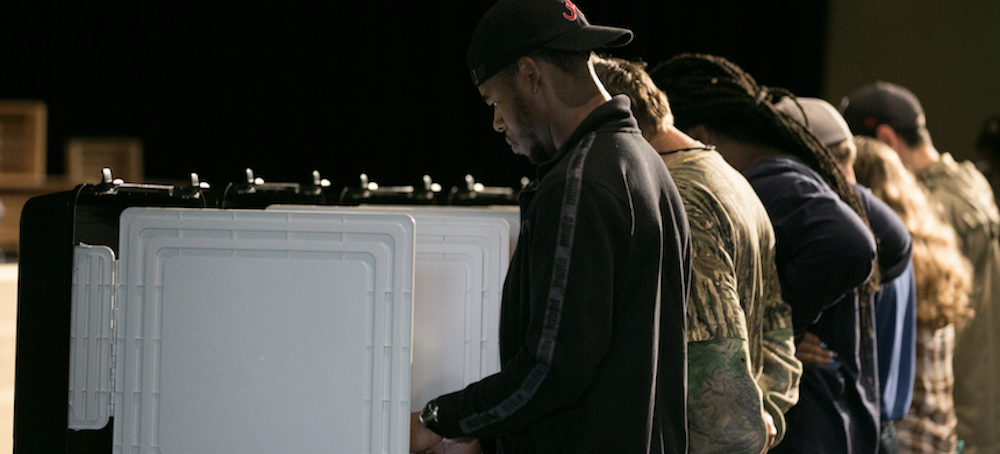 Voters at a polling precinct. (photo: Jessica McGowan/Getty Images)
Voters at a polling precinct. (photo: Jessica McGowan/Getty Images)
The bill would have given the Legislature power to “accept or reject the election results.”
Then, when the state House Speaker from their own party shut it down Tuesday, Rep. John Fillmore, the sponsor of the bill compared the maneuver to a “lynching.” Speaking to VICE News via phone Friday, Fillmore said he “absolutely” stood by his previous comment.
Fillmore introduced the bill earlier this week along with more than a dozen GOP co-sponsors. The bill would have cracked down on early voting, among other things, but the major point of contention was a provision that the Legislature would come into special session after every primary and general election “to review the ballot tabulating process for the regular primary and general elections and on review shall accept or reject the election results.”
Last year, the Arizona Senate contracted the Florida-based company Cyber Ninjas, with no previous election auditing experience, to conduct an audit for the 2020 presidential election, but their report found that former President Donald Trump had lost Arizona by an even bigger margin than the official count.
But House Speaker Russell “Rusty” Bowers—also a Republican—pulled a parliamentary maneuver effectively killing the bill Tuesday, by assigning it to all 12 committees in the Arizona House. On Wednesday, Bowers told Arizona’s Capitol Media Services that he was tying up the bill in committees because the provision on rejecting election results was unacceptable.
“We gave the authority to the people,’’ Bowers said. “For somebody to say we have plenary authority to overthrow a vote of the people for something we think may have happened, where is [the evidence]?”
This isn’t Bowers’ first clash with the pro-Trump wing of the party. Although his counterpart in the Senate, Sen. Karen Fann, enabled Trump’s conspiracy theories by contracting Cyber Ninjas on behalf of the Senate to audit the election, Bowers said in December 2020 that he supported Trump during the election but that he “cannot and will not entertain a suggestion that we violate current law to change the outcome of a certified election.” Bowers’ house was later picketed by Trump supporters.
Fillmore called Bowers’ maneuver a “12-committee lynching” in an interview with KTVK Wednesday.
Fillmore said he would have been willing to cut the provision and that his problem was more with Bowers’ unilateral action than with the criticisms of the bill. Fillmore said Bowers’ message was that “I’m God. I control the state legislature.”
Asked if the provision in his bill was motivated by Trump’s false claims about the legitimacy of the 2020 election, Fillmore declined to say but referenced a January ABC News poll that found only 20 percent of Americans had confidence in our elections.
“We’re in a precarious situation,” Fillmore said. “If 20 percent of the people in this country have confidence in the election, the next step could be volatile and dangerous.”
Fillmore denied that he was a pro-Trump fanatic, saying “some of the Trump people have been very upset” with him in the past for endorsing another Republican presidential candidate over Trump. But he said he voted for Trump in 2020, and he was one of dozens of conservative state legislators who wrote a letter to then-Vice President Mike Pence prior to Jan. 6 asking if he would postpone the certification of Joe Biden’s election win.
Rep. Reginald Bolding, the top Democrat in the Arizona House, told KTVK that Fillmore’s comparison of his bill being stopped to lynching was “inappropriate for a lawmaker.”
“That language leads to these same type of policies, Jim Crow-type language leads to Jim Crow-type policies," Bolding, who is Black, told KTVK.
Despite killing the bill, Bowers has helped oversee a tightening on voting rights in Arizona amid GOP fury over Trump’s loss in the former Republican stronghold. Gov. Doug Ducey signed legislation last year that could remove thousands from the state’s Permanent Early Voting List, in a state where absentee voting had already been the norm for years before the coronavirus pandemic.
And this week, Republicans in the House pushed forward on a bill that would require absentee voters to show their IDs when they drop off ballots. “This is voter suppression, and it will make our lines much longer,” Bolding told the AP Wednesday.
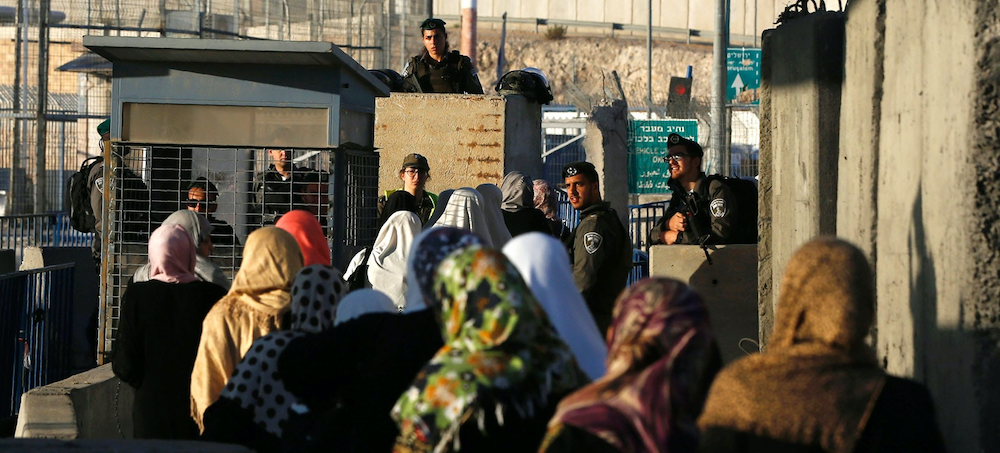 Palestinian women wait to cross through the Qalandia checkpoint near the West Bank city of Ramallah. (photo: Abbas Momani/AFP/Getty Images)
Palestinian women wait to cross through the Qalandia checkpoint near the West Bank city of Ramallah. (photo: Abbas Momani/AFP/Getty Images)
While some in Washington DC and US media decry Amnesty’s conclusions, it’s a different story among some Israeli leaders
Earlier this week Amnesty International released a report making a 280-page case that Israel’s treatment of Palestinians constitutes apartheid. The response in the US was a wave of orchestrated outrage – outrage that not only denies what many prominent Israelis say is true but, in effect, denies their right to say it.
A joint statement by American groups that claim to be pro-Israel – including the American Israel Public Affairs Committee (Aipac), a powerful rightwing lobby organisation – accused Amnesty of seeking to “demonize and delegitimize the Jewish and democratic State of Israel”, a formulation frequently used to imply antisemitism.
Groups that made little criticism of Israel’s military collaboration with South Africa’s white minority regime now profess concern that Amnesty’s report diminishes the suffering of black Africans under apartheid.
As the Guardian’s correspondent in Jerusalem during the Palestinian uprising of the early 2000s, the second intifada, after covering the end of white rule in South Africa, I was struck by how frequently prominent Israelis drew comparisons between the occupation and apartheid. I also noticed how hard pro-Israel groups in the US fought to delegitimize any such discussion.
Yet Amnesty explicitly said that it is not drawing direct parallels with the old South Africa. Its report accuses Israel of crimes against humanity under international laws, including the 1973 Apartheid Convention and the 1998 Rome statute of the international criminal court, which defines apartheid as systematic racial domination.
That did not stop American politicians from piling in with accusations that Amnesty “hates Israel”, although not always to the best effect. The Republican senator Tom Cotton of Arkansas exposed his tenuous grasp on the situation by denouncing the human rights group for “attacking a free democracy where Jews, Christians, and Muslims live in peace”.
If the critics of the report have read it at all, they rarely engage with its detailing of Israel’s system of military rule, segregation and forced removals that treats Palestinians as an inferior racial group. Instead critics are more focused on smearing Amnesty.
A Wall Street Journal editorial, ignoring the report’s substance, called it a “libel” against Israel and claimed that Amnesty is in the company of Hamas, Hezbollah and Iran because the human rights group “all but says the Jewish state shouldn’t exist”.
For those charges to stand up, you have to believe Israel has been led by antisemites who hate their own country. In smearing those who lay out a reasoned case that Israel is guilty of apartheid under international law, American critics are conveniently sidestepping years of damning judgments by Israeli leaders.
As Yossi Sarid, a former Israeli cabinet minister, ex-leader of the opposition, and member of the Knesset for 32 years, put it in 2008: “What acts like apartheid, is run like apartheid and harasses like apartheid, is not a duck – it is apartheid.”
Leading Israeli politicians have warned for years that their country was sliding into apartheid. They include two former prime ministers, Ehud Barak and Ehud Olmert, who can hardly be dismissed as antisemites or hating Israel.
“As long as in this territory west of the Jordan river there is only one political entity called Israel it is going to be either non-Jewish or non-democratic,” Barak said in 2010. “If this bloc of millions of Palestinians cannot vote, that will be an apartheid state.”
Israel’s former attorney general, Michael Ben-Yair, was even clearer.
“We established an apartheid regime in the occupied territories immediately following their capture. That oppressive regime exists to this day,” he said in 2002.
Ami Ayalon, the former head of Israel’s Shin Bet intelligence service, has said his country has “apartheid characteristics”. Shulamit Aloni, the second woman to serve as an Israeli cabinet minister after Golda Meir, and Alon Liel, Israel’s former ambassador to South Africa, both told me that their country practices a form of apartheid.
Israel’s leading human rights group, B’Tselem, published a groundbreaking report last year that described “a regime of Jewish supremacy” over Palestinians that amounted to apartheid. Another Israeli group, Yesh Din, gave a legal opinion that “the crime against humanity of apartheid is being committed in the West Bank”.
The reckoning is not confined to the political class. “The cancer today is apartheid in the West Bank,” AB Yehoshua, one of Israel’s greatest living writers, said in 2020. “This apartheid is digging more and more deeply into Israeli society and impacting Israel’s humanity.”
Those views may be disputed by many in Israel, even a majority. But Aipac and other US groups – which have spent years shoring up support in America for rightwing Israeli governments intent on maintaining their particular form of apartheid – are not concerned about truth.
Hardline pro-Israel groups are lashing out now in fear that the narrative in America is finally shifting. Americans no longer uncritically accept the idea that Israel is desperate for peace and that the occupation is temporary. More and more Americans now see the system Israel has constructed as oppressive and its governments as disingenuous.
Perhaps most worryingly for the Israeli government’s apologists, an increasing number of Jewish Americans share that judgment. A survey of Jewish voters in the US last year found that 25% agreed that “Israel is an apartheid state”. The days of rightwing apologists for Israel imposing their false narrative may finally be numbered.
 A Bengal tiger. (photo: Shutterstock)
A Bengal tiger. (photo: Shutterstock)
The study notes that since 2010, or the last Year of the Tiger, tiger populations have increased, in part due to several restoration efforts. During that time, the first Tiger Summit gathered experts to determine ways to conserve tiger populations across 13 countries. The first record of recovering tiger populations happened in 2016, the first uptick in over a century.
“The 2010 Tiger Summit launched an unprecedented set of tiger conservation initiatives,” said Stuart Chapman, head of the Tiger Summit. “The results show what can be achieved through long-term partnerships for species recovery. The dedication of field teams, conservation partners and communities living in tiger territories has led to these extraordinary results.”
In the new Impact on Tiger Recovery 2010-2022 report, WWF outlines tiger conservation successes, including numbers that have tripled in Land of the Leopard, a national park in Russia and a new, designated tiger protected area, the world’s largest, in China.
To improve tiger population numbers, WWF and its partners have implemented several tactics: restoring tiger habitats, combating the illegal wildlife trade and poaching, expanding the tigers’ range and allowing them to safely cross borders between nations, carefully relocating tigers to reserves to improve breeding, and training volunteers on handling human-tiger conflicts, among several other methods.
“India, Nepal, Bhutan, Russia and China have demonstrated what it takes to increase wild tiger numbers and conserve their habitat,” said said Ginette Hemley, senior vice president of wildlife conservation at WWF-US. “As these countries show, the communities living alongside tiger habitats are instrumental stewards of the nature around them and their partnership is vital. Hopefully, the success of these countries will inspire others, particularly in Southeast Asia, to step up efforts to protect wild tigers and secure the species’ future beyond 2022.”
In a recent survey of PT Alam Bukit Tigapuluh (ABT), or The Thirty Hills Forest Company, in Sumatra, WWF and its partners were able to identify five critically endangered Sumatran tigers and 14 other protected species, showing the importance of these conservation areas. Experts believe there could be more Sumatran tigers in the Thirty Hills area.
“The discovery of three adult female and two male tigers along with prey and many other endangered and threatened species shows that the surveyed area is an important habitat for the survival of Sumatran tigers and other wildlife,” said Dody Rukman, CEO of the ABT company.
While the Impact on Tiger Recovery report and the survey of wildlife in Thirty Hills is encouraging for tiger conservation, WWF warns that these animals are still facing serious threats. Tigers are likely extinct in Cambodia, Laos and Vietnam, and populations faced decline in Malaysia over the past 12 years. Their range is still declining, and WWF estimates their current range to be about 5% of their historic range.
The second Tiger Summit is slated for September 2022 in Vladivostok, Russia. The goal is to determine the next phase of the Global Tiger Recovery Plan, with a focus on setting goals to further expand range and reintroduce tigers to their former habitats.
Follow us on facebook and twitter!
PO Box 2043 / Citrus Heights, CA 95611

